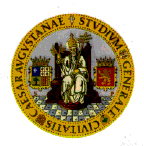Index
page
Aims and Scope
Intended Audience
Topics
Detailed Programme
|
Topics and Lecturers
- Formalisms (Queueing Networks, Untimed Petri Nets,
Stochastic Petri Nets, Untimed and Stochastic Process
Algebras,...);
- Modelling techniques and methods: (running) examples and
case studies.
- Properties and Qualitative Analysis (basic logical
properties, Place-Transition and Colored net correctness
analysis, performance indices and qualitative properties);
- Discrete-Event Simulation (centralized schemas, synchronous
and asynchronous parallel/distributed simulation);
- Markov Chain Generation (bounded Markovian models, one-place
unbounded Markovian models, non-Markovian models);
- Net-driven Markov Chain generation (decomposition and tensor
algebra approach, symmetries and quasi-symmetries, combining
decomposition and aggregation, periodic ordering);
- Net-driven Analytical Methods (PNs and product forms, linear
programming and performance bounds);
- Approximate Net-Driven Decomposition Methods (product-form
approximation, response-time approximation,...)
The lecturers are well-known experts in modelling and
performance evaluation of DEDS. They are involved in theoretical
and applied research and are also collaborating with industry.
They include:
G. Balbo (Torino), B. Baynat (Paris), J. Campos (Zaragoza), G.
Chiola (Genova), Y. Dallery (Paris), S. Donatelli (Torino), C.
Dutheillet (Paris), A. Ferscha (Vienna), G. Franceschinis
(Torino), S. Haddad (Paris), B. Haverkort (Aachen), U. Herzog
(Erlangen-Nuremberg), J. Hillston (Edimburgh), M. Ribaudo
(Torino), M. Sereno (Torino), M. Silva (Zaragoza), E. Teruel
(Zaragoza)
Application domains
- Manufacturing
- Transport
- Telecommunication
- Concurrent architectures
- Concurrent programming
Tools
- GreatSPN
(GRaphical Editor and Analyzer for Timed and Stochastic Petri Nets).
A software package for the modeling, validation, and
performance evaluation of distributed systems using Generalized
Stochastic Petri Nets and their colored extension: Stochastic Well-formed
Nets. The tool provides a friendly framework to experiment with timed
Petri net based modeling techniques. It implements efficient analysis
algorithms to allow its use on rather complex applications, not only toy
examples.
- SPN2MGM.
A tool for specifying stochastic Petri Nets of which the
underlying Markov chain can be solved using matrix-geometric methods.
- Stochastic Process Algebras, such as
TIPP
or PEPA
are compositional specification formalisms discussed within
the performance school. The
TIPPtool
aims at realising all beneficial aspects of
compositional performance modelling. It incorporates
methods for compositional specification as well as solution, based
on state-of-the-art-techniques, and wrapped in a user-friendly
graphical front end.
|

